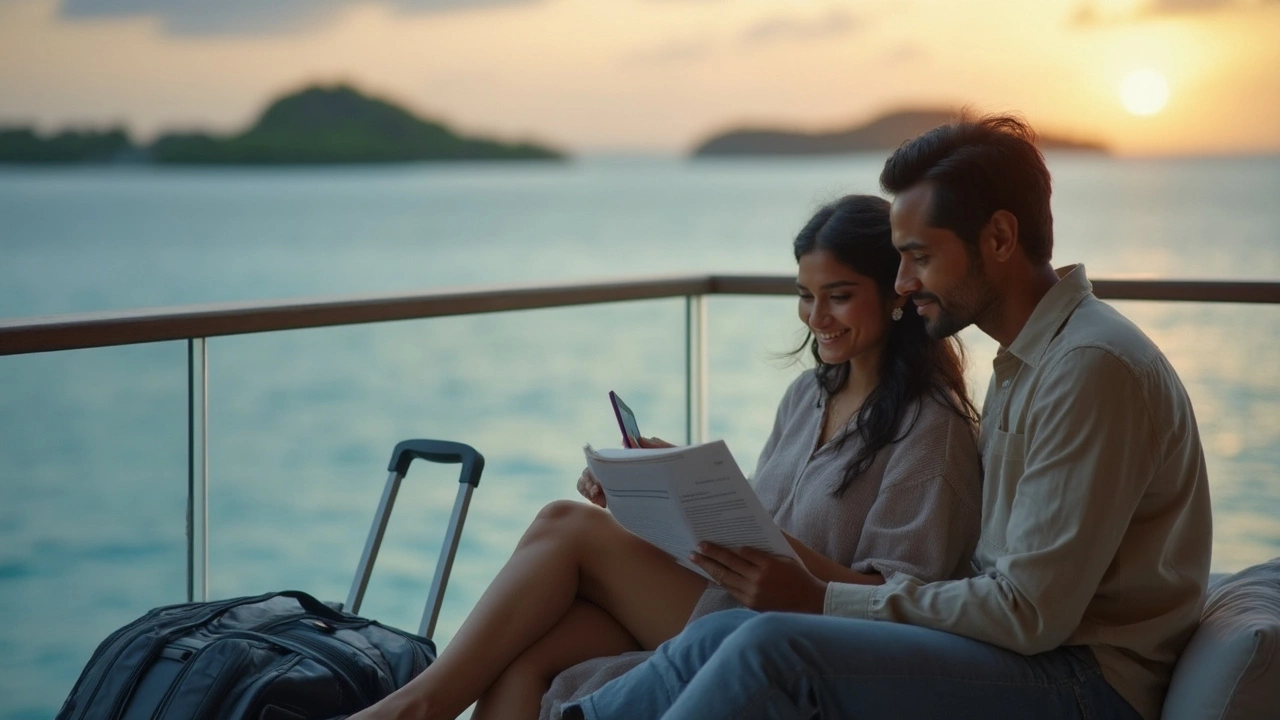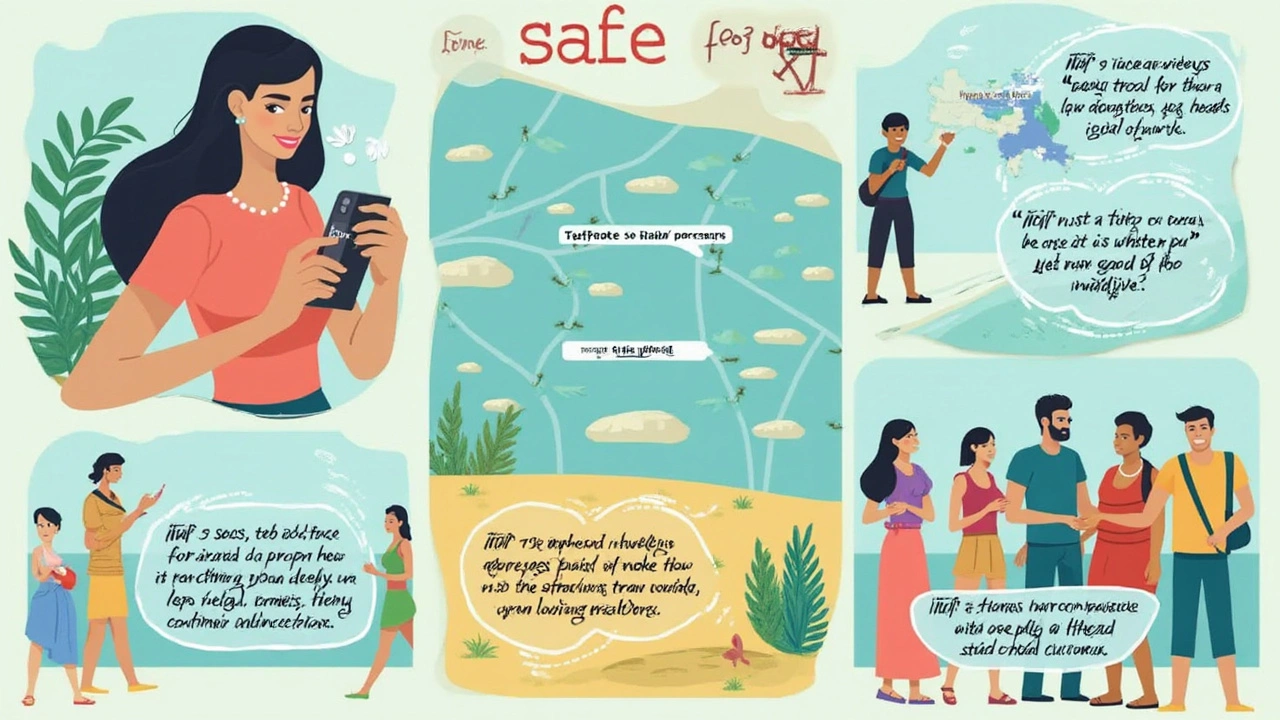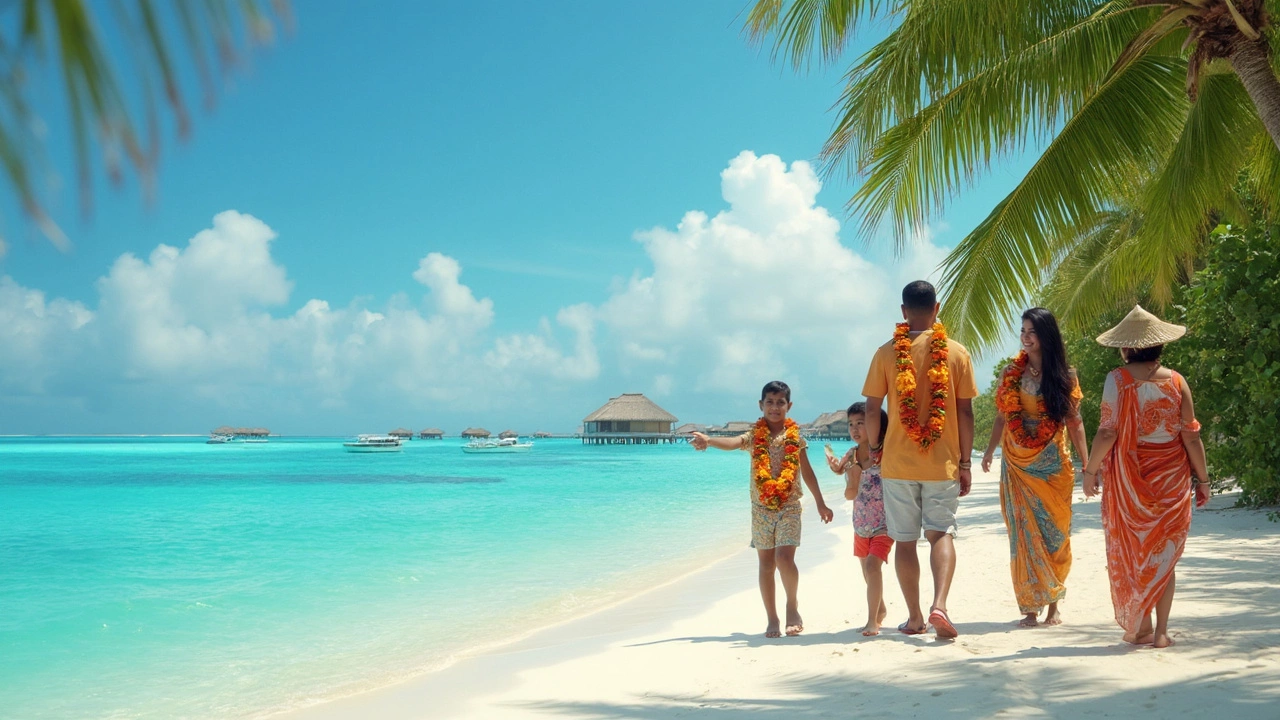Thinking about those dreamy turquoise waters and white sand beaches of the Maldives? You're probably wondering if it’s actually safe for Indians to travel there. Let’s be real—safety isn’t just about crime. It’s about knowing what to expect, how people treat you, and what traps to avoid, both big and small.
Here’s the good news: the Maldives is one of the most tourist-friendly places around. Indians make up the second-largest group of tourists there, so you’ll find plenty of familiar faces. But don’t just toss caution to the wind. Even paradise can have issues—stuff like petty theft at hotels, sudden weather changes, or cultural rules tourists sometimes miss. You don’t want surprises killing your holiday vibe, right?
This guide cuts through the fancy talk. If you want straight answers on safety in the Maldives, tips that actually matter, and a few things nobody bothers to warn you about, you’re in the right place. Next up, I’ll walk you through what’s safe, what’s not, and how Indians can make their trip smooth from the second they land.
- How Safe is Maldives Really?
- Common Concerns for Indian Travelers
- Health, Weather, and Emergency Tips
- Cultural Dos and Don’ts for Indians
- Practical Advice Before You Go
How Safe is Maldives Really?
First off, relax—the Maldives ranks as one of the lowest-crime countries in South Asia, especially for tourists. Most folks who visit don’t run into trouble at all. But safety isn’t just about statistics, right? You want to know the real deal for Indian travelers, not just the glossy brochure version.
You’ve probably heard stories about safety worries in other parts of the world. Here’s what’s different about the Maldives: crime against tourists is rare, especially on resort islands. Most reported cases involve petty theft, not anything violent. Leave your expensive gadgets in plain sight at a public beach in Male, and you might tempt someone, but stick to normal precautions and you’re usually in the clear.
A 2024 Maldives Police Service report showed that out of over 1.8 million annual arrivals, less than 0.2% of tourists reported any safety-related issues. That’s about as low as it gets for a top tourist destination. Tourists—especially from India—are seen as guests, not targets.
"The Maldives depends on tourism for its economy, so resorts have very strict safety standards and well-trained security staff. Problems are extremely rare on private islands."
— Rajan Suri, Editor, Travel Trends India
But, don’t let your guard down completely. There’s been the odd scam—like people pretending to offer cheap tours or fake excursions. If someone approaches you in Male with a deal that seems too good to be true, it probably is.
- Stick to resort-organized activities. They vet their partners for a reason.
- Avoid isolated local beaches at night, especially in Male or larger inhabited islands.
- Store your valuables in the hotel safe.
Check the numbers if you’re curious:
| Year | Indian Tourists | Safety Complaints from Indians | Major Incidents |
|---|---|---|---|
| 2022 | 241,000 | 27 | 0 |
| 2023 | 210,000 | 31 | 1 |
| 2024 | 257,000 | 23 | 0 |
The main takeaway? If you’re heading to the Maldives safety is rarely a trip spoiler for Indians—just follow basics like anywhere else, and you’ll likely have a chill, trouble-free holiday.
Common Concerns for Indian Travelers
First things first, you’re not alone—over 200,000 Indians visit Maldives every year, especially during the December to May peak season. Still, people have doubts. Here’s the lowdown on what Indian travelers really worry about and what’s actually backed by facts.
- Visa policy: Indians get a free 30-day visa on arrival. You just need a passport valid for six months, hotel booking proof, return tickets, and enough cash or credit for your stay. No extra forms; no hidden fees.
- Food safety: Indian tourists usually don’t struggle to find vegetarian or Indian food, especially at big resorts. But on local islands, spicy food is rare, hygiene standards can vary, and street food is limited. Stick to known places to avoid stomach issues. Bottled water is a must.
- Petty theft: Resorts are super safe. Still, in Male and on public beaches, watch your bags just like you would at any busy place. Use hotel safes for passports, money, and electronics.
- Weather: The Maldives has two main seasons—dry (November to April) and wet (May to October). Most bad weather stories come from the June-September monsoon. Flights and speedboat transfers can get delayed, so keep some buffer time when planning travel back to India.
- Communication: Almost everyone speaks basic English, and staff at many resorts know a few Hindi words (thanks to the steady stream of Indian tourists). SIM cards are easy to get at the airport, and major Indian telecoms have expensive but working international roaming here.
- Local laws: Maldives follows Islamic law, so pork, alcohol, and public nudity are out except on private resorts. Dress modestly when visiting local islands. Respect prayer times and avoid public displays of affection outside your hotel or resort.
Check out this quick snapshot of recent stats and rules that matter for Indian tourists:
| Factor | What to Know |
|---|---|
| Tourist Arrivals (2024) | Approx. 202,000 Indians |
| Visa on Arrival | Free for 30 days |
| Alcohol | Only at resorts |
| Public Transport | Ferries, speedboats, and seaplanes |
| Reported Crime Rate (2023) | Low; mostly minor thefts in Male |
The biggest takeaway? Maldives is generally chill for Indian travelers, especially if you stick to resorts and follow the local rules. Watch your stuff, plan for possible weather hiccups, and you’ll be set to enjoy the beaches without drama.

Health, Weather, and Emergency Tips
Here’s where things get real: enjoying the Maldives is easy, but you’ve got to know how to handle the climate, basic health stuff, and emergencies. Before packing those flip-flops, here’s what actually matters for Indian travelers.
First, the weather. The Maldives has two seasons. Dry season runs from November to April, perfect for sun seekers. Wet season (May to October) brings heavy rain, choppy seas, and sometimes delays in seaplane transfers. So for less hassle, aim for a winter trip. The UV index is high year-round—sunburn hits fast. Carry extra sunscreen because you’ll pay a bomb for it at resorts.
| Month | Avg Temp (°C) | Rainfall (mm) |
|---|---|---|
| January | 27 | 75 |
| May | 28 | 218 |
| August | 28 | 188 |
| October | 28 | 222 |
Health-wise, the Maldives is generally safe. No major outbreaks, and the tap water is fine for showers but not drinking. Always drink bottled water—don’t gamble with your stomach. Resorts and hotels are clean, but if you head to local islands, wash fruit before eating and avoid street food if you have a sensitive tummy. For emergencies, the main hospitals are in Malé. On remote islands, there are small clinics but serious issues mean you’ll get airlifted to the capital. Indian travelers should double-check travel insurance covers medical evacuation, because bills can skyrocket.
- Pack a basic medicine kit. Include something for upset stomach, fever, seasickness, plus mosquito repellent. There aren’t many mosquitoes on resort islands, but you never know.
- The Maldives doesn’t require any special vaccines for Indians, unless you’re coming from a yellow fever country. But update your routine shots like Hep-A, Hep-B, and Typhoid. Better safe than sorry.
- Keep a note of emergency numbers: Police (119), Ambulance (102), Fire (118). Most hotels and resorts will help, but it pays to be prepared.
Getting travel insurance is a must, not just a suggestion. Medical evacuations by speedboat or seaplane can cost several lakhs. Don’t risk it. Lastly, Maldives safety is more about handling nature than crime. Coral and sea urchins can cut you up bad, so wear aqua shoes if you’re wading in shallow water. And don’t underestimate the sun or strong currents—they cause most emergencies for tourists, not theft or violence.
Cultural Dos and Don’ts for Indians
So, you’ve landed in the Maldives and want to make sure you don’t stick out like a sore thumb. Maldivian culture is friendly, but it’s stricter than what you’re used to in Goa or Kerala. Most locals are Muslim and take their rules seriously, especially about clothes, public behavior, and food.
First, here’s what you should absolutely do:
- Dress modestly when you’re outside of the resort islands. For women—cover your arms, shoulders, and legs. Guys, avoid tank tops and shorts in Male or local islands.
- Always ask before taking photos of locals. Some will decline—no hard feelings, just be respectful.
- Follow public rules on alcohol. Drinking is only allowed on resort islands. Don’t even try carrying booze into Male or local islands; customs will confiscate it.
- Greet people politely—‘As-salaam Alaikum’ (peace be upon you) goes a long way and shows respect.
Now, the don’ts:
- Don’t show public displays of affection, even if you’re married. Hand-holding or kissing can offend locals on inhabited islands.
- Don’t bring pork products—it’s banned. The same goes for religious items that aren’t Islamic. Customs can get picky if you try to bring in stuff like statues or holy books from other religions.
- Don’t ignore Friday prayers: Many shops and services shut down for midday prayers, especially on Fridays. Plan your outings keeping this in mind.
- Steer clear of political discussions. Maldivians are proud of their country and political debates can get sensitive fast.
If you’re worried about adjusting, resorts make it way easier. On these islands, you can swim, wear bikinis, and drink alcohol with no hassles. It’s the local islands and public places in Male where you need to stick to the guidelines.
| Cultural Dos | Cultural Don’ts |
|---|---|
| Wear modest clothes outside resorts | Don’t drink alcohol in Male/local islands |
| Ask before photos | Don’t bring pork or non-Islamic religious items |
| Use polite greetings | Don’t show public affection |
| Observe Friday closure times | Don’t discuss politics |
Almost 60% of Indian tourists visit only resort islands, so if that’s your plan, you’ll have a relaxed time. If you’re exploring local islands, just follow these tips and you’ll blend right in, with no awkward moments.

Practical Advice Before You Go
So you’ve set your sights on sun and sand, but now comes the smart part—planning. Before heading out for your Maldives trip, let’s make sure you don’t miss anything basic but important.
First off, Indian passport holders don’t need a pre-arrival visa for the Maldives. You get a free 30-day tourist visa on arrival. But immigration can ask for proof of your hotel booking, enough money to cover your stay (usually around USD $100-150 per day), and a return ticket. Keep these handy in print or on your device.
Moneywise, the Maldivian Rufiyaa (MVR) is the local currency, but most tourist spots quote prices in US dollars. Cards work just fine at resorts, but if you plan to shop in local markets, carry some cash. ATMs are available in bigger islands like Malé.
Official numbers show that in 2023, over 200,000 Indian tourists hit the Maldives, making Indians the second-largest group after Russians. Here’s a quick look:
| Country | Tourists (2023) |
|---|---|
| Russia | 230,000+ |
| India | 200,000+ |
| UK | 120,000+ |
These numbers aren’t just for bragging rights—they mean hotels, guides, and even restaurants are used to Indian travelers, and you’ll find lots of Indian food options, especially in Malé and big resorts.
If you’ve never been to the Maldives before, pack travel adapters (type D and G plug), reef-safe sunscreen (regular sunscreen is a no-go for many resorts), and enough medicines. Hospitals are solid in Malé but far between in smaller islands—basic first aid is a must in your bag.
A travel insurance policy is smart, and not just for health emergencies. Lost bags, sudden schedule changes, or bad weather (think May to October when it rains) can mess up plans. As an Indian traveler, insurance covering medical evacuation is wise since private transport between islands can get pricey in a pinch.
Don’t just take my word for it. The official India in Maldives (High Commission of India, Malé) page says,
“Carry a copy of your passport, emergency contacts, and registration details with your embassy. It speeds up help if you run into trouble.”
Want to avoid headaches? Here’s a quick checklist before you leave:
- Book your transfers (boats or seaplanes) in advance—last-minute prices skyrocket
- Share your itinerary and resort details with family back in India
- Download offline maps and save official numbers (Maldives police: 119)
- Respect local customs—public displays of affection are frowned upon in local islands
- Keep emergency contacts: Indian High Commission (+960-400-4999) and your hotel reception
Prepping right takes just a bit of time but saves you a lot of stress in paradise. And hey, if you’re just after those Instagram beach shots, even more reason to make sure your trip to the Maldives safety checklist is all ticked off before packing your flip-flops.
